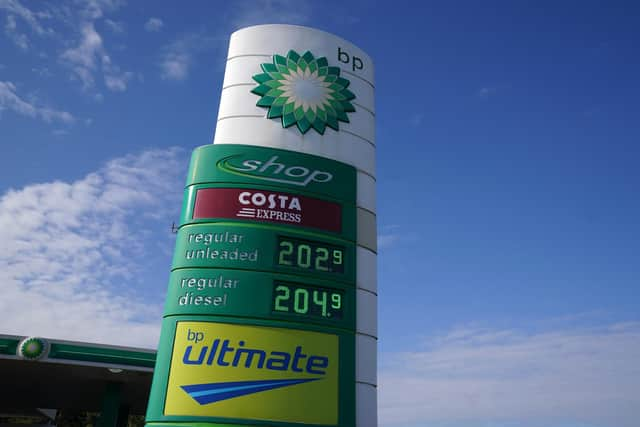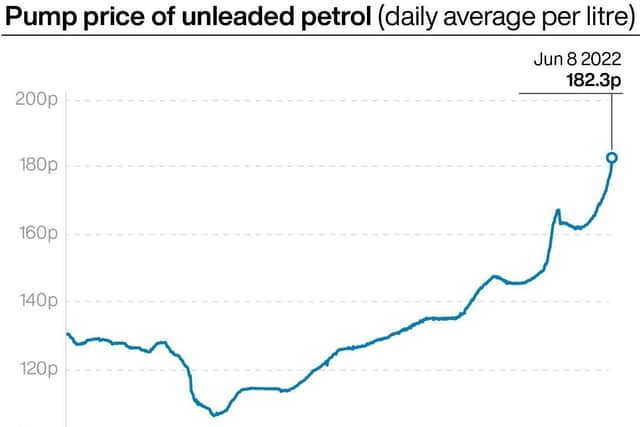Fuel prices: What are the average fuel prices in the UK- and how to drive efficiently to save on fuel costs
and live on Freeview channel 276
Drivers are being hit by record fuel prices, with some of the sharpest rises in fuel price history.
We look at ways you can drive efficiently and save money not only on fuel, but on the number of times you fill up at the pump.
What is the current price of petrol?


Advertisement
Hide AdAdvertisement
Hide AdThe average price of a litre of petrol at UK forecourts reached a record 182.3p on Wednesday.
That was an increase of 1.6p compared with Tuesday, taking the average cost of filling a 55-litre family car to £100.27.
The average price of a litre of diesel on Wednesday was 188.1p.
Some petrol forecourts are already selling petrol above £2.


Why is fuel so expensive?
Pump prices began to soar as the cost of oil increased following Russia’s invasion of Ukraine in February.
Advertisement
Hide AdAdvertisement
Hide AdThe price of oil is continuing to rise due to increased demand for fuel across the world as China eases its coronavirus restrictions and the US and Europe enter the peak summer driving season.
Where can you get the cheapest fuel?
Supermarket forecourts are generally the cheapest sites to buy fuel.
They usually charge around 4p per litre below average UK prices.
Using fuel price comparison websites like PetrolPrices.com can help you to find the cheapest fuel prices near you.
Advertisement
Hide AdAdvertisement
Hide AdPetrol Prices covers around 8,500 pumps across the UK and the results are updated to the most recent available data, usually between one and four days.
How to drive efficiently and drive to save fuel
Driving as smoothly as possible will maximise your car’s fuel efficiency.
That means accelerating gently and avoiding excessive speed and heavy braking.
Many cars are most efficient when driven between 45mph and 50mph.
Advertisement
Hide AdAdvertisement
Hide AdWhen driving uphill you should aim to gain momentum by accelerating a little before you reach them, then ease off as you drive up.
Why a roof box and boot space is important in fuel consumption
Additional weight in your vehicle can add to fuel consumption, and items such as a roof box or unused clutter in your boot can add to your fuel usage.
Take your roof bars and box off when you are not using them, as they create wind resistance which increases fuel consumption.
Empty roof racks add 16% drag when driving at 75mph, according to the Energy Saving Trust.
Advertisement
Hide AdAdvertisement
Hide AdAlso have a clear out of your cars boot and only keep essential items in the boot. In order to save on fuel consumption, you should aim to reduce excess weight and remove items from your boot if you do not need them for a particular journey.
Does a car’s air conditioning and heating use fuel?
Yes, so if possible keep your air con turned off or on low, especially if it is on automatically.
Check tyre pressure
Check your tyres are inflated to the pressure stated in your owner’s manual.
Under-inflated or over-inflated tyres cut fuel economy.
It is worth remembering that air in your tyres are impacted by weather, and you should check pressure when colder for more accurate readings.
Should I combine journeys?
Advertisement
Hide AdAdvertisement
Hide AdWarm engines are more efficient than cold ones, so making one round trip is better for fuel efficiency than several short journeys, even though the mileage could be the same.
Of course, you could also consider walking or cycling rather than driving for short journeys.
What action is being called for to reduce petrol costs?
RAC fuel spokesman Simon Williams said the average price of petrol crossing the “thoroughly depressing threshold of £100 a tank” meant it was “a truly dark day” for drivers.
He went on: “There’s almost certainly going to be upward inflationary pressure, which is bad news for everybody.
Advertisement
Hide AdAdvertisement
Hide Ad“While fuel prices have been setting new records on a daily basis, households up and down the country may never have expected to see the cost of filling an average-sized family car reach three figures.”
Mr Williams said many people will be hoping for further financial support from the Government as the 5p per litre cut in fuel duty “looks paltry” because wholesale petrol costs have increased by five times that amount since it was implemented in March.
“A further duty cut or a temporary reduction in VAT would go a long way towards helping drivers, especially those on lower incomes who have no choice other than to drive,” he added.
The AA called for a further 10p-per-litre cut in fuel duty and the introduction of a “fuel price stabiliser” which would see the rate lowered when prices rise, and increased when prices drop.
Advertisement
Hide AdAdvertisement
Hide AdThe firm’s president Edmund King said: “Enough is enough. The Government must act urgently to reduce the record fuel prices which are crippling the lives of those on lower incomes, rural areas and businesses.
“A fuel price stabiliser is a fair means for the Treasury to help regulate the pump price, but alongside this they need to bring in more fuel price transparency to stop the daily rip-offs at the pumps.
“The £100 tank is not sustainable with the general cost-of-living crisis, so the underlying issues need to be addressed urgently.”
